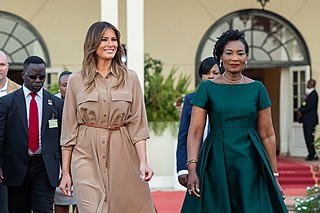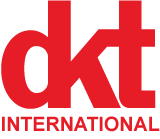Related Research Articles
The Mexico City policy, sometimes referred to by its critics as the global gag rule, is a former United States government policy that blocked U.S. federal funding for non-governmental organizations (NGOs) that provided abortion counseling or referrals, advocated to decriminalize abortion, or expanded abortion services. When in effect, the Mexico City policy is a U.S. government policy that requires foreign non-governmental organizations to certify that they will not "perform or actively promote abortion as a method of family planning" with non-U.S. funds as a condition for receiving U.S. global family planning assistance, and during its January 23, 2017 implementation any other U.S. global health assistance, including U.S. global HIV and maternal and child health (MCH) assistance.

The United States President's Emergency Plan For AIDS Relief (PEPFAR) is a United States governmental initiative to address the global HIV/AIDS epidemic and help save the lives of those suffering from the disease. Launched by U.S. President George W. Bush in 2003, as of May 2020, PEPFAR has provided about $90 billion in cumulative funding for HIV/AIDS treatment, prevention, and research since its inception, making it the largest global health program focused on a single disease in history until the COVID-19 pandemic. PEPFAR is implemented by a combination of U.S. government agencies in over 50 countries and overseen by the Global AIDS Coordinator at the United States Department of State. As of 2021, PEPFAR has saved over 20 million lives, primarily in Sub-Saharan Africa.

Pathfinder International is a global non-profit organization 501(c)(3) that focuses on sexual and reproductive health and rights, including reproductive health, family planning, HIV/AIDS prevention and care, and maternal and newborn health. The organization operates in more than 15 low- and middle-income countries in Africa and South Asia. According to its website, "Pathfinder is driven by the conviction that all people, regardless of where they live, have the right to decide whether and when to have children, to exist free from fear and stigma, and to lead the lives they choose."

The Global Fund to Fight AIDS, Tuberculosis and Malaria is an international financing and partnership organization that aims to "attract, leverage and invest additional resources to end the epidemics of HIV/AIDS, tuberculosis and malaria to support attainment of the Sustainable Development Goals established by the United Nations". This multistakeholder international organization maintains its secretariat in Geneva, Switzerland. The organization began operations in January 2002. Microsoft founder Bill Gates was one of the first donors to provide seed money for the partnership. From January 2006 it has benefited from certain US Privileges, Exemptions, and Immunities under executive order 13395, which conferred International Organizations Immunities Act status on it.

Randall L. Tobias is an American governmental figure and former chief executive officer of Eli Lilly and Company. A Republican, he was appointed the first United States Director of Foreign Assistance, and served concurrently as the administrator of the U.S. Agency for International Development (USAID), with the rank of ambassador.

HIV/AIDS in India is an epidemic. The National AIDS Control Organisation (NACO) estimated that 2.14 million people lived with HIV/AIDS in India in 2017. Despite being home to the world's third-largest population of persons with HIV/AIDS, the AIDS prevalence rate in India is lower than that of many other countries. In 2016, India's AIDS prevalence rate stood at approximately 0.30%—the 80th highest in the world. Treatment of HIV/AIDS is primarily via a "drug cocktail" of antiretroviral drugs and education programs to help people avoid infection.

Phil Harvey was an American entrepreneur, philanthropist and libertarian who set up large-scale programs that delivered subsidized contraceptives in poor countries. Harvey was the founder and former president of DKT International, the Washington, D.C.-based charity that implements family planning and HIV/AIDS prevention programs in 57 countries across Africa, Asia and Latin America. He was the chief sponsor of the DKT Liberty Project which raised awareness about freedom of speech issues in the U.S. Harvey was also the president of Adam & Eve, the North Carolina–based company that sells sex toys, adult films and condoms. Consequently, he has been called "one of the most influential figures in the American sex industry today".

The first AIDS case identified in Brazil was in 1982. Infection rates climbed exponentially throughout the 1980s, and in 1990 the World Bank famously predicted 1,200,000 cases by 2000, approximately double the actual number that was later reported by the Brazilian Ministry of Health and most international organizations. South and Southeast have 75% or more of this infection. The Northeast has 33% of the population but only 10% of AIDS.

David Brookman Smith, known professionally as D. Brooks Smith, is a Senior United States circuit judge of the United States Court of Appeals for the Third Circuit. He was previously Chief Judge of both the United States Court of Appeals for the Third Circuit and the United States District Court for the Western District of Pennsylvania, and is the only judge in the history of the Third Circuit to have served as both a chief district judge and chief of the Court of Appeals. Since January 2022, Smith has served as Penn State Law's new jurist in residence.

The United States established diplomatic relations with Malawi in 1964 after Malawi gained independence from the United Kingdom. Malawi's transition from a one-party state to a multi-party democracy significantly strengthened the already cordial U.S. relationship with Malawi. Significant numbers of Malawians study in the United States. The United States has an active Peace Corps program, Centers for Disease Control and Prevention, Department of Health and Human Services, and an Agency for International Development (USAID) mission in Malawi. Both countries have a common history and English language, as they were part of the British Empire.
Northwest Immigrant Rights Project (NWIRP) is a non-profit legal services organization in Washington state. NWIRP's mission is to promote justice by defending and advancing the rights of immigrants through direct legal services, systemic advocacy, and community education.
The Federal government of the United States requires certain non-governmental organizations (NGOs) that receive federal anti-HIV/AIDS or anti-trafficking funds to adopt an organization-wide policy opposing prostitution and sex-trafficking. This requirement, known as the anti-prostitution pledge, has been in place since 2003.
The Dominican Republic has a 0.7 percent prevalence rate of HIV/AIDS, among the lowest percentage-wise in the Caribbean region. However, it has the second most cases in the Caribbean region in total, with an estimated 46,000 HIV/AIDS-positive Dominicans as of 2013.
The Global Health Council is a United States-based non-profit leading networking organization "supporting and connecting advocates, implementers and stakeholders around global health priorities worldwide". The Council is the world's largest membership alliance dedicated to advancing policies and programs that improve health around the world. The Council serves and represents thousands of public health professionals from over 150 countries. They work "to improve health globally through increased investment, robust policies and the power of the collective voice.": According to their website the Council "convenes stakeholders around key global health priorities and actively engages key decision makers to influence health policy."

DKT International (DKT) is a charitable non-profit organization that promotes family planning and HIV prevention through social marketing. The Washington, D.C.-based DKT was founded in 1989 by Phil Harvey and operates in 90 countries in Africa, Asia, and Latin America. Its revenue largely comes from sales of low-cost contraceptives. In 2021, DKT sold 901 million condoms, 111 million cycles of oral contraceptives, 26.5 million injectable contraceptives, 20 million emergency contraceptives and 4.7 million intrauterine devices (IUDs), among other products, in 59 countries. This is equivalent to 54.2 million couple years of protection (CYPs), making DKT one of the largest private providers of contraceptives in the developing world. The average cost per CYP was US$1.65. DKT's marketing strategies have included advertising, creating location-specific brands, working with social networks and militaries, and targeting high-risk groups. DKT also works with health workers and clinics that provide family planning products, information, and services. Charity Navigator has given DKT a four-star rating for its finances, with 96.5% of its budget going towards programs and 3.4% towards headquarters expenses and fund raising in 2019.

Conant v. Walters, 309 F.3d 629, is a legal case decided by the United States Court of Appeals for the Ninth Circuit, which affirmed the right of physicians to recommend medical marijuana. The Court of Appeals affirmed the earlier decision of the United States District Court for the Northern District of California, which was filed under the caption Conant v. McCaffrey. Though the case involved chronic patients with untreatable diseases, the decision does not name these conditions as a prerequisite, nor does it limit drugs which may or may not be illegal.
Agency for International Development v. Alliance for Open Society International, Inc., 570 U.S. 205 (2013), also known as Alliance for Open Society I, was a United States Supreme Court decision in which the court ruled that conditions imposed on recipients of certain federal grants amounted to a restriction of freedom of speech and violated the First Amendment.
Wolf v. Vidal, 591 U.S. ___ (2020), was a case that was filed to challenge the Trump Administration's rescission of Deferred Action for Childhood Arrivals (DACA). Plaintiffs in the case are DACA recipients who argue that the rescission decision is unlawful under the Administrative Procedure Act and the Fifth Amendment. On February 13, 2018, Judge Garaufis in the Eastern District of New York addressed the question of whether the government offered a legally adequate reason for ending the DACA program. The court found that Defendants did not provide a legally adequate reason for ending the DACA program and that the decision to end DACA was arbitrary and capricious. Defendants have appealed the decision to the Second Circuit Court of Appeals.
Agency for Int'l Development v. Alliance for Open Society International, 591 U.S. ___ (2020), also known as Alliance for Open Society II, was a United States Supreme Court case in which the Court held that compelled speech required as a condition for funding on foreign non-governmental affiliates of U.S. non-government organizations does not violate First Amendment rights.

Executive Order 13990, officially titled Protecting Public Health and the Environment and Restoring Science to Tackle the Climate Crisis is an executive order signed by President Joe Biden on January 20, 2021, which implements various environmental policies of his administration including revoking the permit for the Keystone XL Pipeline and temporarily prohibiting drilling in the arctic refuge.
References
- 1 2 "Alliance for Open Society International Inc". GuideStar . Retrieved 7 January 2014.
- 1 2 3 USAID v. AOSI: About the Plaintiffs. Retrieved 25 November 2013.
- 1 2 3 4 Masenior, Nicole Franck; Chris Beyrer (2007-07-01). "The US Anti-Prostitution Pledge: First Amendment Challenges and Public Health Priorities". PLOS Medicine. 4 (7): e207 EP –. doi:10.1371/journal.pmed.0040207. PMC 1925124 . PMID 17676943.
- ↑ OSI Sues USAID over Dangerous Public Health Policy
- 1 2 3 Medical News Today "Federal Court Holds "Anti-Prostitution Pledge Requirement" Violates First Amendment" (Main Category: HIV/AIDS, Article Date: 15 May 2006)
- ↑ US Court of Appeals (2007 February 27) District of Columbia Circuit Decision in DKT v. USAID No. 05-CV-01604. Retrieved 21 November 2013.
- 1 2 3 American Civil Liberties Union and the ACLU Foundation: Amicus Brief in Alliance For Open Society International, Inc., et al. v. United States Agency For International Development, et al. (11/9/2005)
- 1 2 Brennan Center for Justice:Alliance for Open Society International v. USAID Questions and Answers About the August 8, 2008 Ruling Granting InterAction and Global Health Council a Preliminary Injunction
- 1 2 USAID v. AOSI Timeline. Retrieved 21 November 2013.
- ↑ Roberts, John (20 June 2013). "Agency for Int'l Development v. Alliance for". Legal Information Institute . Cornell Law School . Retrieved 17 July 2013.